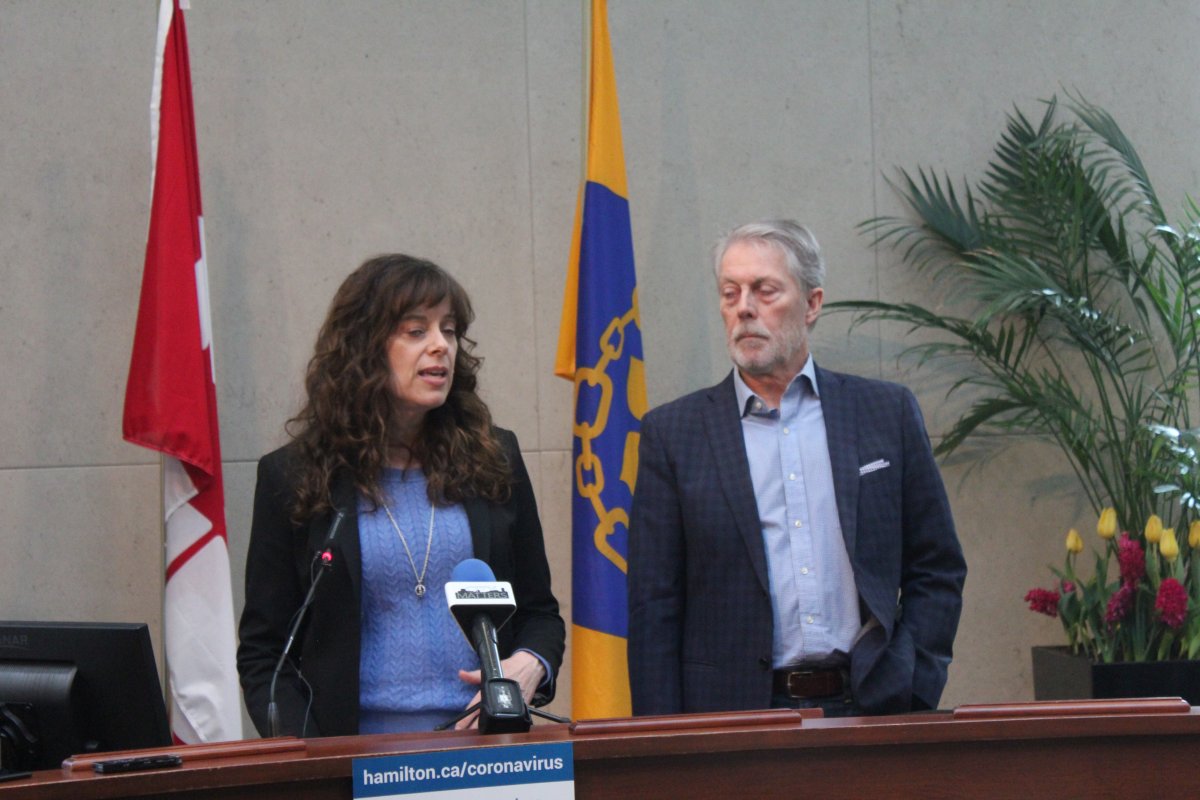Hamilton public health (HPH) reported 11 new cases of COVID-19 on April 3, bringing the city’s overall total of positive cases to 138.

In an update at city hall on Friday, Dr. Elizabeth Richardson, medical officer of health, said 51 of the cases are connected to travel, while 33 are believed to have come through community transmission.
Richardson says community-acquired cases have been a concern recently as 44 per cent of all new cases in the last 10 days have been traced back to community transmission.
The city’s medical officer went on to provide some insight into a typical COVID-19 case, which is usually a 10-day affair between becoming symptomatic and receiving a positive test result.
“The situation that you’re seeing today really represents what happened 10 days ago because it takes that long for somebody to be exposed, to go on to get sick, to be tested and then to get their results back.”
Overall, the city still has two deaths — both women in their 80s at Heritage Green nursing home in Stoney Creek.
On Friday, the Ontario government projected just under 1,600 COVID-19 deaths and 80,000 cases for the province by the end of April, if current practices — including social distancing — remain in place.
Further data suggested the province would have seen 300,000 cases of COVID-19 and 6,000 deaths by the end of the month if there was no government action or intervention.
Richardson said the city does not have any similar local projections at present, but did say that there could be numbers on a Hamilton model in the near future.

“We have had folks here in Hamilton, both people who are working with the hospitals and people working in public health and people at McMaster and some of our students, actually our residents who work with us, looking at the modeling,” said Richardson.
“So we’ll take a little bit of a look at these ones and look at perhaps how we could refine our models and have more about that next week.”
Forty-five of the city’s 138 cases have been resolved with those individuals no longer showing signs of the virus, according to public health.
Nineteen new positive cases in Halton Region
Halton Region reported 19 more positive COVID-19 cases on Friday, for a total of 100. Nine of those new cases were centred around Oakville which now accounts for 40 of the 100 positive results.
Thirty-nine people in Halton region are symptomatic and still awaiting test results, according to public health.
On Thursday, April 2, Halton attributed 35 cases of their positive cases to an individual with a history of travel. Fourteen people in the region have needed hospital care for the affliction.
Two people have died since March 18 when a 51-year-old Milton man was the first to die in an Oakville hospital.
Haldimand-Norfolk with four COVID-19 related deaths
Meanwhile, Haldimand-Norfolk Health Unit reported another death on Thursday. The counties are jointly reporting 43 positive cases as of April 3 with a total of four deaths due to the new coronavirus.
Three of the deaths have been connected to a long-term care home in Hagersville, Ont.
Niagara’s municipalities declare a state of emergency
Niagara region public health (NRPH) reported another 17 positive tests on Friday, moving the total number of local cases to 99 with 19 now resolved.

Niagara Health hospitals say they have treated 103 confirmed cases of COVID-19, which includes a number of residents who do not live in the Niagara region.
Thirteen are still in wards at those hospitals and they say seven people with COVID-19 have died but do not yet know if the virus was the cause of all those deaths
Niagara Health is reporting four deaths among Niagara residents, with the latest reported by St. Catharines hospital on Thursday.
After outbreaks at four long-term care facilities in Welland and Niagara Falls, plus the fear of a “surge” in COVID-19 activity, the 12 local municipalities jointly declared a state of emergency on Friday.
The directive helps law enforcement to step up and take action on those who fail to practice physical distancing with the threat of fines between $750 and $1,000 for those failing to comply with orders.
Brant County confirms first COVID-19 related death
Brant County Health Unit (BCHU) confirmed it’s first death connected to COVID-19 on Thursday.
In a release, public health said it was a female in her 60’s with pre-existing medical conditions.
The agency is reporting 35 confirmed cases in the county as of April 3.
Questions about COVID-19? Here are some things you need to know:
Health officials caution against all international travel. Returning travellers are legally obligated to self-isolate for 14 days, beginning March 26, in case they develop symptoms and to prevent spreading the virus to others. Some provinces and territories have also implemented additional recommendations or enforcement measures to ensure those returning to the area self-isolate.
Symptoms can include fever, cough and difficulty breathing — very similar to a cold or flu. Some people can develop a more severe illness. People most at risk of this include older adults and people with severe chronic medical conditions like heart, lung or kidney disease. If you develop symptoms, contact public health authorities.
To prevent the virus from spreading, experts recommend frequent handwashing and coughing into your sleeve. They also recommend minimizing contact with others, staying home as much as possible and maintaining a distance of two metres from other people if you go out.
For full COVID-19 coverage from Global News, click here.





Comments